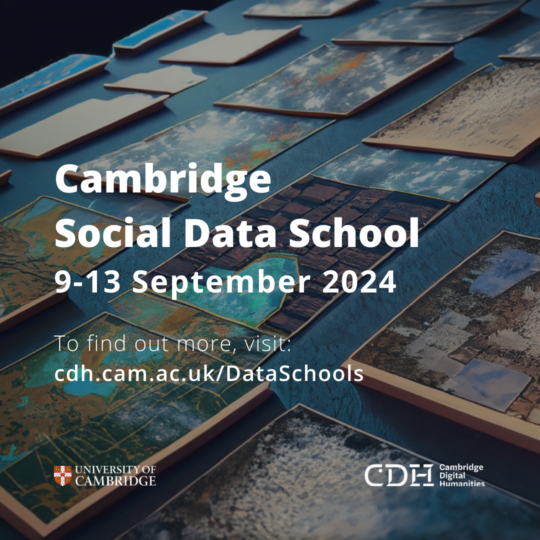| 20 Jan 2015 | 11:30am - 2:00pm | Room SR24, English Faculty | |
- Description
Description
Booking has now closed for this event.
Researchers in wide range of academic disciplines have begun to experiment with ‘crowdsourcing’ – creating or mobilising online communities of volunteers to assist them in their research. This workshop, which is co-organised with the Arthur Schnitzler Digital project, will cover the creation of a crowdsourcing project from conception to completion with Tim Causer of Transcribe Bentham and Transcriptorium.
This workshop offers Cambridge researchers and graduate students the opportunity to explore different ways of using crowd-sourcing methods in the context of humanities research, in collaboration with researchers from the Arthur Schnitzler digital edition who are planning a small-scale crowdsourcing project to engage wider audiences with their work. If you are planning a crowd-sourcing project of your own, or are considering using crowdsourcing methods in future, please book online here. The workshop is free to attend, but spaces are limited. Please note, because of restricted capacity this event is open to Cambridge University – affiliated staff and PhD students only.
About the speaker: Tim Causer, is a Senior Research Associate at the Bentham Project, Faculty of Laws at UCL. He joined the Bentham Project in 2010, and has been responsible for the day-to-day running of Transcribe Bentham, the award-winning collaborative transcription initiative. Most of his time is now spent working on the EC FP7-funded tranScriptorium project, which is developing solutions for the transcription of digitised historical manuscripts using Handwritten Text Recognition software. This work involves the development of a crowdsourced transcription platform incorporating HTR technology.
Dr Causer is a historian of convict transportation and punishment, and has a special interest in the infamous Norfolk Island penal settlement. He carried out his PhD research, supported by an AHRC Doctoral Award, at the Menzies Centre for Australian Studies, King’s College London, and also holds an MA and an MLitt in history from the University of Aberdeen. His most recent publication was an online edition of the Memorandoms of James Martin, the narrative of a convict who absconded from Sydney in March 1791, the manuscript of which is part of UCL’s Bentham Papers collection.
About Arthur Schnitzler digital. Digital Critical Edition (works from 1905 to 1931)
The cooperative research project, Arthur Schnitzler digital. Digital Critical Edition (Works from 1905 to 1931), is being conducted by scholars at the Bergische University Wuppertal, the University of Cambridge, University College London and the University of Bristol, in partnership with Cambridge University Library, the German Literary Archive at Marbach, and the Center for Digital Humanities at the University of Trier.
The aim of the project is to produce a new critical edition in digital form, to be published on an open access online platform hosted by Cambridge University Library. In contrast to those of other representative figures of the classical Modernist period, the works of the great Austrian writer, Arthur Schnitzler (1862-1931), have until now not been made available in a scholarly edition. Historical critical editions of works from the early period (up to 1904) have begun to be produced in print and e-book form by a team based in Vienna, supported by the FWF (de Gruyter 2011ff.), while our project exploits the potential of digital methods for its editions of works from 1905 onwards. The project draws upon the enormous store of archival material, saved in 1938 and transferred to Cambridge University Library, which still holds the larger part of the literary estate (a smaller collection is housed at Marbach, with individual holdings elsewhere). Our research will provide insights into Schnitzler’s working methods and the aesthetic principles that guided them. This will shed new light on an author whose rich and varied oeuvre helped to define the whole period of classical Modernism (c. 1890-1930), with a highly developed sensitivity to its problems and contradictions.
The online portal will for the first time draw together the physically dispersed archival holdings in a virtual form, combining the functions of digital archive and edition. The collected extant material – both manuscript and typescript – will be digitally reproduced, transcribed, and made accessible through commentaries, registers etc. Through different textual views (diplomatic transcriptions, genetically interpreted reconstructions, amended reading versions) a multi-perspectival edition will be produced, with due regard to both ‘textuality’ and ‘materiality’. Beyond this, the digital medium will open up the possibility of representing in an appropriate manner the rich picture of Schnitzler’s mode of writing. With its hypertextual structures and resources for non-sequential ordering, the digital edition will capture the systemic interdependence of composition processes that sometimes stretched over decades, with complex networks of transmission crossing textual and generic boundaries.
For administrative enquiries please contact Michelle Maciejewska.





